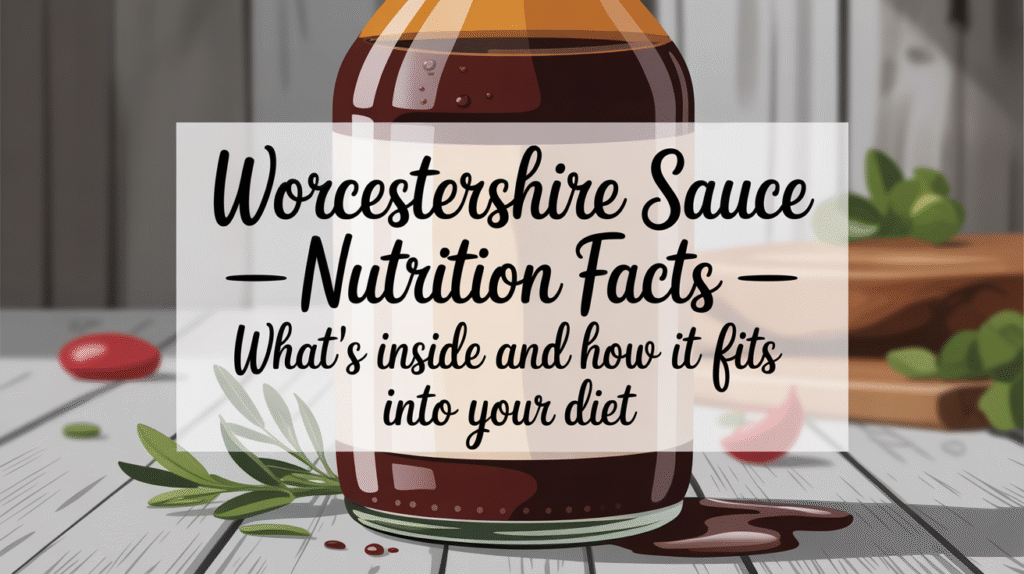Affiliate Disclosure: PantryBrands.co.uk is a participant in the Amazon.co.uk Associates Programme. As an Amazon Associate, we earn from qualifying purchases made through links on this site.
Worcestershire sauce is low in calories and fat, but high in flavour, making it an excellent addition to meals for those looking to enhance taste without adding excessive nutrients. It contains trace amounts of vitamins and minerals, with its most notable nutritional element being sodium. Although used in small quantities, it’s still worth understanding what exactly you’re adding to your food.

This guide breaks down the nutrition facts of Worcestershire sauce, compares brands, and explains how it fits into different dietary plans.
The Basic Nutritional Profile of Worcestershire Sauce
A typical serving size of Worcestershire sauce is one teaspoon (5 ml). Although this amount is small, it can make a noticeable difference in taste and sodium intake.
Average Nutrition Per 1 Teaspoon (5 ml)
Here’s what you can expect in terms of average values:
- Calories: 5–10 kcal
- Total Fat: 0 g
- Sodium: 65–200 mg
- Total Carbohydrate: 1–2 g
- Sugars: 1–1.5 g
- Protein: 0 g
Because it’s used in such small amounts, Worcestershire sauce has minimal impact on daily calorie intake.
Key Nutrients and Their Impact
Although it isn’t a significant source of macronutrients, Worcestershire sauce contains several components worth noting.
Sodium Content
This is the most prominent nutritional factor in Worcestershire sauce.
- Contributes to overall salt intake
- Can be problematic for those on low-sodium diets
- Ranges widely by brand (low-sodium versions are available)
Sugar and Carbohydrates
Molasses and sugar are key ingredients, but the quantities are minor.
- Adds a subtle sweetness to balance the tanginess
- Still only 1–2 grams of carbs per serving
This makes it manageable for those on low-sugar or diabetic-friendly diets when used sparingly.
Vitamins and Minerals
Worcestershire sauce contains trace amounts of the following:
- Iron – Small quantities from molasses and anchovies
- Vitamin B12 – Found in anchovies
- Niacin (Vitamin B3) – Present in small amounts due to fermented ingredients
These micronutrients are minimal and not a significant dietary source.
Comparison Between Regular and Special Diet Versions
Nutritional values can vary slightly between traditional, vegan, low-sodium, and gluten-free versions.
Vegan Worcestershire Sauce
Without anchovies, vegan versions may have slightly different nutritional profiles.
- Typically similar in calories and sugar
- Slightly lower sodium in some brands
- No Vitamin B12 unless fortified
Low-Sodium Versions
These are designed for those managing blood pressure or salt-sensitive conditions.
- Sodium levels reduced by up to 50%
- Slightly different taste but still rich in flavour
Gluten-Free Worcestershire Sauce
While the nutritional content remains similar, ingredients like malt vinegar are replaced.
- No significant difference in calories or sugar
- Safer for coeliacs and gluten-sensitive individuals
How Worcestershire Sauce Fits into Different Diets
Due to its low calorie and fat content, Worcestershire sauce can be integrated into various dietary plans.
Weight Loss and Low-Calorie Diets
A teaspoon only contains 5–10 calories, making it ideal for flavour enhancement without adding bulk.
- Use in marinades, soups, or dressings
- Better alternative to heavier sauces or gravies
Low-Carb or Keto Diets
With only 1–2 grams of carbohydrates per serving, it can be suitable for low-carb diets if sugar intake is controlled.
- Monitor usage if following strict ketogenic limits
- Opt for versions with no added sugars when possible
Diabetic Diets
It can be used moderately without major concerns.
- Sugar content is low
- Helps add flavour without increasing carb count significantly
Heart-Healthy Diets
This is where moderation becomes key due to sodium.
- Choose low-sodium options if managing blood pressure
- Limit use if already consuming high-sodium meals
Tips for Using Worcestershire Sauce Healthily
Although Worcestershire sauce is relatively low in nutrients, it’s wise to use it strategically in your cooking.
Smart Usage Suggestions
Here’s how to get the most from it nutritionally:
- Use small amounts to flavour vegetables and lean proteins
- Avoid combining with other high-sodium sauces (e.g. soy sauce)
- Consider making a homemade version to control ingredients
Nutritional Comparison with Similar Sauces
It helps to understand how Worcestershire stacks up against other common condiments.
Worcestershire vs Soy Sauce
- Soy sauce usually has more sodium per teaspoon
- Worcestershire offers more complexity with less salt
- Soy sauce is saltier and simpler in flavour
Worcestershire vs Barbecue Sauce
- BBQ sauce is higher in sugar and calories
- Worcestershire provides depth without the sweetness
- Worcestershire works better in savoury, non-sweet dishes
FAQs About Worcestershire Sauce Nutrition Facts
Here are some questions and answers about the nutritional profile of Worcestershire sauce.
Is Worcestershire sauce high in calories?
No, it’s very low in calories. A teaspoon contains about 5–10 kcal, making it ideal for low-calorie diets.
How much sodium is in Worcestershire sauce?
It varies by brand, but typically ranges from 65 to 200 mg per teaspoon. Low-sodium versions are available for those needing to limit salt intake.
Is Worcestershire sauce keto-friendly?
Yes, in small amounts. It contains around 1–2 grams of carbohydrates per serving and can be included in a keto or low-carb diet if the rest of the meal is balanced.
Does Worcestershire sauce contain sugar?
Yes, it contains a small amount of sugar, usually around 1–1.5 grams per teaspoon, due to molasses or sugar in the recipe.
Can Worcestershire sauce be part of a diabetic-friendly diet?
Yes, when used in moderation. It is low in sugar and carbohydrates, making it a safe choice for people with diabetes as long as it fits within their overall daily intake.
